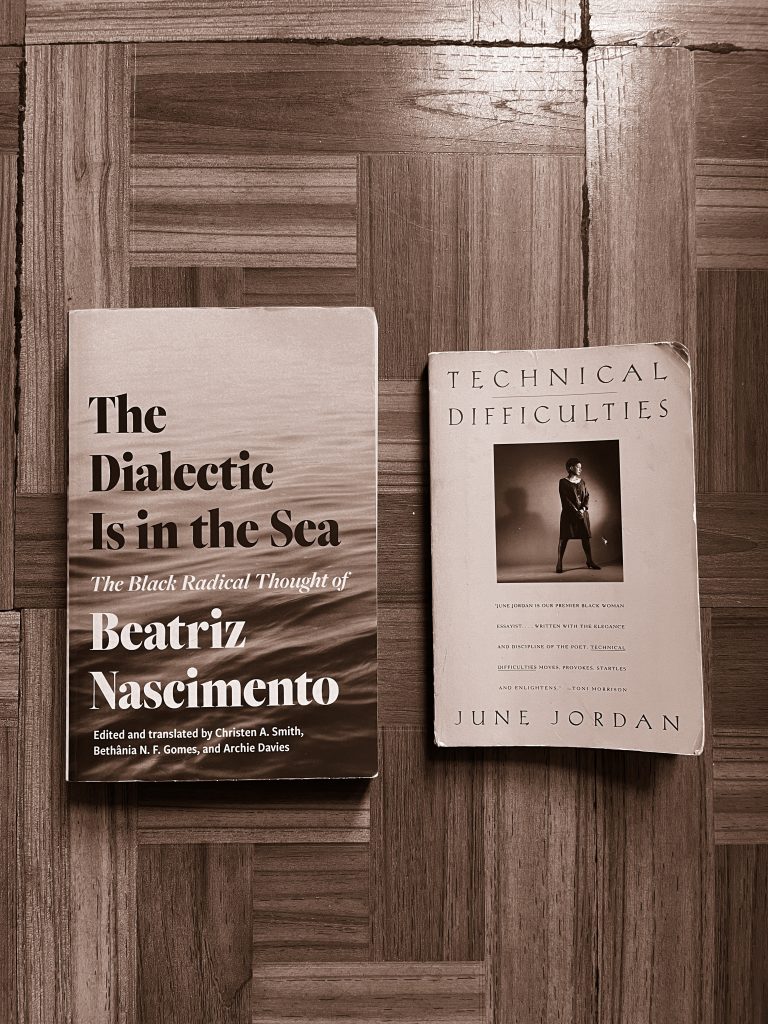What I am Reading Now…
Yasmina Price
August 2024
June Jordan, Technical Difficulties: African-American Notes on the State of the Union (1992)
And if we shall reach our safety in this place, then we shall not forget the centuries of collective agitation/the seismic/secretive/home-based/coalitional and worldwide/persevering bravery that made even the privileges of our current peril a remarkable possibility […]
“We shall not forget.” Even as the call to unearth and recover has been institutionally captured, used to extend entrenched material monopolies, turned into a selective preciousness about selective archives or twisted into a rhetorical ouroboros that deflates any chance of action—the inherited teachings of the past are a doorstop to the “otherwise” portal closing entirely.
Leaning against subway doors, I finished a second reading of June Jordan’s essays in Technical Difficulties: African-American Notes on the State of the Union. In her writing there is dazzling clarity, solace, insight and generosity, as her pen turns on economic monopolies, entrenched architectures of power and designed social dysfunction. As the subtitle indicates, Jordan positions her blackness and diagnoses the gangrene of ‘American illusions of autonomy, American delusions of individuality.’ With an internationalist awareness of the ‘dialectical unfolding’ of our globally shared fate, she understood in 1992 what was clear in 1948 and is glaring in 2024—that the truth of the United States is unambiguously written in its enduring genocidal complicity with the Zionist entity occupying Palestine. As other essays, poems and her role as an educator attest, Jordan was motivated to ‘subvert and challenge and eliminate the intellectual icons of Western civilization.’ Her notes on uneven valuations of life, Jesse Jackson’s presidential campaign, bisexual politics of sexuality, the mythification of Martin Luther King Jr., the classed and racialized puppeteering of public education and being a single black woman, are often fresh and often useful. Technical Difficulties, written in her poet’s tempo of prose, is a materialisation of her pedagogical commitments, antidotes to forgetting, and her astral faith in a collective capacity to remember and reinvent ways to sustain life in a machinery of death.
(A little gift, the secondhand copy I picked had a dedication in the inner flap: ‘Read, enjoy, and become inspired to keep writing your own – Mom’).
Beatriz Nascimento, The Dialectic Is in the Sea: The Black Radical Thought of Beatriz Nascimento (2023)
Thinking like water and moving like a dancer, Beatriz Nascimento dreamed a totality of Black History. She was a multiform militant, whose public and scholarly writings were one facet of her contributions to the Movimento Negro in 1970s and 1980s Brazil. Against the background and foreground of the military dictatorship which shaped those decades and the state’s legacy of historical negation, Nascimento took on a project of recovery, focused on quilombos and a collective politics of memory. Quilombos were spatial and social practices of rebellion, the Brazilian iteration of the maroon communities which existed across Latin America in the wake of enslavement and colonial settlement, constellating a counter-geography of liberation.
What Nascimento saw in the quilombos was nothing less than the heart of a ‘tradition of life for black Brazilians,’ to be reactivated as materially instructive insurgent imaginary. She saw them as an ancestral continuum of struggles for black liberation, mobilized towards assembling an insurgent communal identity. In calling on the significance of quilombos for her contemporary emancipatory social movements, Nascimento was an urgent voice in an inherited refusal to be assimilated or acquiesce to the colonial architecture of the Brazilian state. Braiding her rigorous analysis with intimate insights, her essays and poems chronicle a woman of effervescent vitality and boundless curiosity, attuned to pleasure and beauty.
Compiling her essays and a few poems, The Dialectic Is in the Sea: The Black Radical Thought of Beatriz Nascimento (2023) came out last year as the first such effort in English translation, edited by Nascimento’s daughter, teacher and choreographer Bethânia N. F. Gomes, scholar Christen A. Smith and translator Archie Davies, who speak as a chorus in the final section. Their conversation is movingly expressive of a shared effort, most poignantly for the way Gomes holds Nascimento’s remembrance, as many black daughters of black mothers have done and continue to.
Stuart Hall, ‘Gramsci’s Relevance for the Study of Race and Ethnicity’ (1986)
With a special affection for the essays, I have returned many times to Stuart Hall’s ‘Gramsci’s Relevance for the Study of Race and Ethnicity’ (1986). His application of Antonio Gramsci towards a kinetic and rigorous understanding of economy, race and culture remains…relevant. A key dimension of this continued salience is Hall’s focus on Gramsci’s methodology, pointing to such key nodes as historical specificity, geographic heterogeneity, non-reductionism, pluralistic identities, not assuming correspondences, and productive sensitivity to ideological contradictions. Hall writes: ‘Gramsci proves, on closer inspection, and despite his ‘Eurocentric’ position, to be one of the most theoretically fruitful, as well as one of the least known and least understood, sources of new ideas, paradigms and perspectives in the contemporary studies of racially structured social phenomena.’
Safi Faye, Kaddu Beykat (1975)
Speaking a letter, the voice of Safi Faye opens her film Kaddu Beykat (1975). The filmic text joins her voice with that of her grandfather, who passed away 11 days after the production and to whom the film is dedicated. Bookended with thankful acknowledgements to her family and the Serer peasants of her home village of Fad’jal, Faye made the film—whose title means ‘Words of Farmers’—as a collective expressive channel. Incurring the ire of the Senegalese government, this film was an unequivocal indictment of the neocolonial agricultural policies imperiling the Serer community. Her principles were also articulated through an ethical, everyday poetics of form, with which Faye offered a teaching in re-engineering the given template of ethnographic documentaries. Kaddu Beykat is an act of cinematic memorywork, rendering film as a technology of transmission for the communal oral knowledge of the Serer, preserving what came before colonisation and what will outrun its shadow.
Yasmina Price is a New York-based writer and film programmer completing a PhD at Yale University. She focuses on anti-colonial cinema from the Global South and the work of visual artists across the African continent and diaspora, with a particular interest in the experimental work of women filmmakers. Curatorial work includes: In the Images, Behind the Camera: Women’s Political Cinema 1959-1992 (Brooklyn Academy of Music, May 2022), Wayward Waters: Black Cinema and The Atlantic (LACMA and Pan African Film & Arts Festival, February 2023), and Struggle Of Memory: Forgetting Haiti, Remembering Ayiti (AFA, February 2024). Her writing appears in the Baffler, the Nation, Film Quarterly, Criterion, Hammer & Hope and elsewhere.
Reading
Technical Difficulties: African-American Notes on the State of the Union, June Jordan (Pantheon, 1992)
The Dialectic Is in the Sea: The Black Radical Thought of Beatriz Nascimento, edited and translated by Christen A. Smith, Bethânia N. F. Gomes, Archie Davies (Princeton University Press, 2023)
Watching
Kaddu Beykat, Dir. Safi Faye (1975)

Please note the views published in What I am Reading Now… are personal reflections of the contributors.
These may not necessarily represent the views of the University of Dundee.
Readers who wish to make a donation to support Medical Aid for Palestinians can do so here.
———
